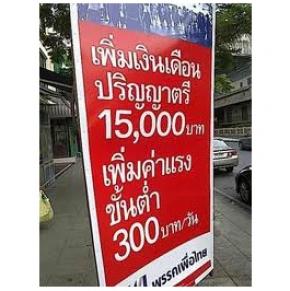ID :
206630
Mon, 09/12/2011 - 12:40
Auther :
Shortlink :
http://m.oananews.org//node/206630
The shortlink copeid
Bt300 minimum wage causes relocation of plants to border: ECOT

BANGKOK, September 12 (TNA) - The Employers’ Confederation of Thailand (ECOT) reported on Monday that business operators are moving their plants to areas bordering with Myanmar and Cambodia, where labor costs are cheaper, as the government will be raising daily minimum wages to 300 baht in the coming months.
In a workshop on the 300-baht daily minimum wages, jointly organized in Bangkok on Monday by the ECOT and the Geneva-based International Labour Organization (ILO), ECOT chief Anantachai Khunananthakul cautioned that the new Thai government's wage hike would heavily affect tens of thousands of small and medium-sized enterprises (SME) and subcontractors, acknowledging he has learned that electronic manufacturers are now moving their plants to Aranyaprathet District of Thailand's eastern Sa Kaeo Province bordering Cambodia and to Mae Sot District of the country's western Tak Province bordering Myanmar, where labor costs are cheaper.
Anantachai said, however, that he is relieved that local employers now have four more months to prepare themselves for the new 300-baht minimum wage hike, which will first start in seven provinces, and that the ECOT will gather problems of employers nationwide and report them to the Labour Ministry for further consideration and action later this month.
Meanwhile, Thai Labour Minister Phadermchai Sasomsab, revealed that his ministry is listening to all parties affected by the 300-baht daily minimum wage policy, especially SMEs, and it will then implement measures to relieve the impacts, namely in power and water charges for the employers and he corporate income tax to 23 per cent in 2012 and to 20 per cent in 2013, as well as a temporary reduction of local employers’ contributions to the Social Security Fund (SSF).
The labour minister confirmed that the new Pheu Thai Party-led government would first raise the minimum wages to 300 baht a day in seven provinces in January next year; while those in other provinces will be initially raised by about 40 per cent, before they will be further increased to the 300-baht benchmark over the next two years. (TNA)
In a workshop on the 300-baht daily minimum wages, jointly organized in Bangkok on Monday by the ECOT and the Geneva-based International Labour Organization (ILO), ECOT chief Anantachai Khunananthakul cautioned that the new Thai government's wage hike would heavily affect tens of thousands of small and medium-sized enterprises (SME) and subcontractors, acknowledging he has learned that electronic manufacturers are now moving their plants to Aranyaprathet District of Thailand's eastern Sa Kaeo Province bordering Cambodia and to Mae Sot District of the country's western Tak Province bordering Myanmar, where labor costs are cheaper.
Anantachai said, however, that he is relieved that local employers now have four more months to prepare themselves for the new 300-baht minimum wage hike, which will first start in seven provinces, and that the ECOT will gather problems of employers nationwide and report them to the Labour Ministry for further consideration and action later this month.
Meanwhile, Thai Labour Minister Phadermchai Sasomsab, revealed that his ministry is listening to all parties affected by the 300-baht daily minimum wage policy, especially SMEs, and it will then implement measures to relieve the impacts, namely in power and water charges for the employers and he corporate income tax to 23 per cent in 2012 and to 20 per cent in 2013, as well as a temporary reduction of local employers’ contributions to the Social Security Fund (SSF).
The labour minister confirmed that the new Pheu Thai Party-led government would first raise the minimum wages to 300 baht a day in seven provinces in January next year; while those in other provinces will be initially raised by about 40 per cent, before they will be further increased to the 300-baht benchmark over the next two years. (TNA)





